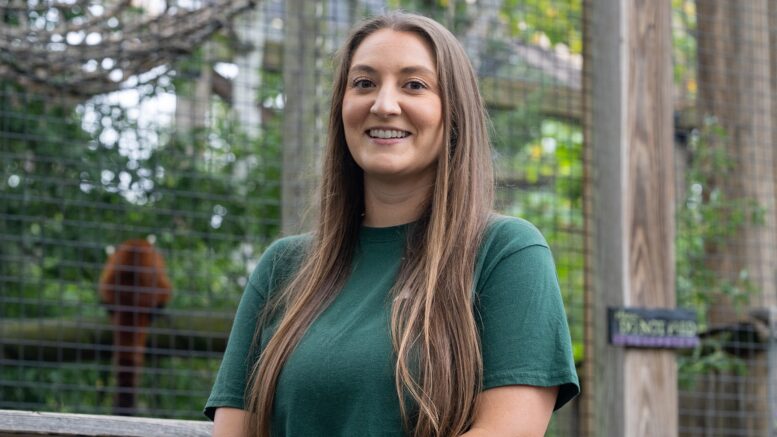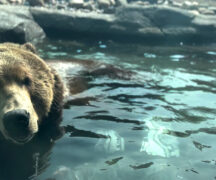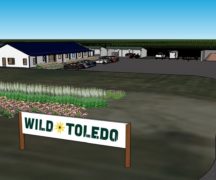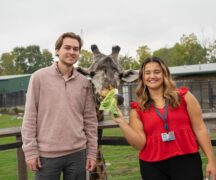From BGSU OFFICE OF MARKETING & BRAND STRATEGY
A Bowling Green State University alumna is using her dream career as a small mammal keeper at the Toledo Zoo to inspire others to enter the field of zoology and to pursue their goals.
In her job, Molly Beattie ’15 ’18 notices the faces of young girls and boys as they closely watch while she feeds animals, works on training techniques or cleans enclosures. In doing so, she also recalls another young girl doing the same thing roughly two decades ago.
“I remember being in the primate area myself and looking through the glass at the keepers as they went about their job, and wishing that was me,” Beattie said. “And here I am, back at the place that I loved as a kid. I imagine some of those kids coming through the zoo today are thinking the same thing, and I guess I’m proof that their dreams can come true.”
Beattie, a Bowling Green native who earned both a bachelor’s degree in 2015 and a master’s degree in 2018 in biology from BGSU, worked at zoos in Texas and Alabama before returning to northwestern Ohio in January.
“When I was growing up, that was the zoo I always went to, so when the opportunity came up to work there and be back home, close to my family and friends, it was an easy decision to make,” she said about accepting the position in Toledo.
Her passion for caring for animals has been her companion throughout her youth, her education and her work life.
“I have always been interested in animals, without knowing what specific route I would take,” she said. “I thought I might want to be a veterinarian or work in research, but ultimately I found that the thing I enjoyed the most was the hands-on experience of working with animals on a daily basis.”
While in graduate school, Beattie had the opportunity to conduct fieldwork in a remote area of the northern Lower Peninsula of Michigan, studying crayfish and how fish diet affects crayfish behavior. BGSU biological sciences professor Dr. Paul Moore oversaw that project, and he lauded Beattie’s work in the field.
“Molly is very insightful and an intuitive scientist,” Moore said. “She is quietly tireless in her work ethic and her care for detail when collecting data.”
Before she began working full-time, Beattie did a six-week stint as a volunteer at an animal rehabilitation facility in Australia, helping injured animals prepare for a return to the wild.
Beattie said her BGSU education and training helped her get started in the very competitive zoo career field.
“I developed a lot of different skills along the way that helped me, and my two degrees certainly helped, especially in getting that first job in the zoo field,” she said. “My faculty advisor, Dr. Moore, definitely helped me develop the skills to become a professional.”
BGSU and the Toledo Zoo recently announced a strategic partnership with the zoo’s Wild Toledo program to increase learning and research opportunities for students and faculty and protect and enhance conservation efforts of the region’s wildlife and natural habitats.
Under the partnership, Wild Toledo will expand its operations to the BGSU campus, where native plants will be grown on 14 acres of land on the University’s campus along Poe Road near Mercer Road. Wild Toledo transforms turf grass and non-native ornamental plantings into biologically diverse prairie ecosystems that create pollinator habitats, reduce property management costs and nutrient run-off and sequester carbon.
Although Beattie is a small mammal keeper at the Toledo Zoo, she rotates through a variety of departments and also cares for hippos, orangutans, skunks, otters, gorillas and Tasmanian devils, along with many other animals. She said that besides feeding the animals and cleaning the enclosures, she also is responsible for conservation work, education, talks and demonstrations.
“Zookeepers do a lot of things that people don’t see or realize,” she said. “I think I enjoy the training aspect the most since you are engaged with the animal and trying to build trust. It is really cool to have that connection when they recognize you and trust you.”
She said the work is often very demanding, but by having a true passion for the profession, the challenges can be overcome.
“The work can be exhausting, but you know that every day will be different and that is exciting,” she said. “And not many people can say they walk into work and the first thing they do is toss a banana into a hippo’s mouth or sit down to bottle feed a baby gibbon.”
Beattie said the “keeper chats” she presents, which give detailed information on certain animals to the zoo’s visitors, push her out of her comfort zone and could well be the most valuable aspect of her job.
“Often times you will find someone in the group who really shows an interest in red pandas or Tasmanian devils,” she said. “You hope they come away from that experience more aware of how unique and important these animals really are.”





